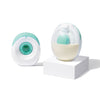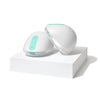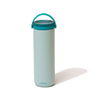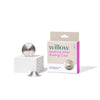Whether you’re an expectant mother or currently cradling your newborn, you know choosing the right breast pump is important for you and your baby. But given the significant differences between hospital-grade pumps and personal or regular pumps, trying to decide can be quite overwhelming.
Know that it’s okay to feel intimidated by all the choices out there, especially when you’ve already got so much on your mind. The truth is, finding the right breast pump is a learning experience. You might have to try a few out before finding the best one for you.
To help empower you, we’ve laid out the differences between hospital-grade pumps and regular pumps. From pumping power to noise, you’ll learn all the pros and cons so you can make an informed decision.
What Is a Hospital-Grade Pump?
A hospital-grade breast pump is typically used in a hospital (hence the name) or clinical setting. It uses a closed system, meaning the milk doesn’t go through any tubing; instead, it goes straight into a collection item, such as a bag or bottle.
Hospital-grade pumps can vary in size and shape, depending on the manufacturer. Typically, however, they all have a motor and a breast milk kit for collection, which includes items such as flanges and bottles.
Pros of Hospital-Grade Pumps
Using a hospital-grade pump might seem intimidating for new moms, but they definitely have some notable benefits:
-
Help with breastfeeding challenges: For mothers who are experiencing milk production challenges, their lactation consultant may recommend a hospital-grade pump to help.
-
Durable: It can be downright heartbreaking when your breast pump stops working. Since hospital-grade pumps are designed to withstand frequent, heavy-duty use, you can often rely on them for the long term.
-
Efficient: If you’re a frequent pumper, it can be annoying when a pump doesn’t do the job right. Thanks to their strong motors, hospital-grade breast pumps can pump milk quite effectively.
Cons of Hospital-Grade Pumps
For all their advantages, hospital-grade pumps do have some drawbacks for nursing moms:
-
Expensive: While hospital-grade breast pumps can be wonderfully efficient, they can also cost a pretty penny. Whether you rent or buy one, you may find yourself spending more compared to a regular pump.
-
Noisy: Hospital-grade pumps have relatively powerful motors, which means you’ll hear a lot of loud whirring. This can make it hard to be discreet when you’re pumping in a public environment, such as at the workplace.
-
Complex cleaning: Due to their larger size and multiple parts, hospital-grade pumps may take more time and effort to clean after each use.
Find your perfect pump.
Find your perfect pump.
Flexibility. Convenience. Control. No matter which pump you pick.
What Is a Regular Pump?
Whether you’re nursing full-time or planning to return to work and pump, a regular breast pump can be an attractive pump choice. Known as personal pumps, you can use these smaller pumps at home or on the go.
Personal pumps come in all shapes and sizes and feature a small motor. The pump can be manual, electric or battery-powered, giving you plenty of choices.
Like hospital-grade pumps, a personal pump kit often comes with all the necessary accessories, like flanges and collection bottles. Depending on the brand, personal pumps may come with a variety of features, such as extraction settings, allowing you to customize your pumping experience.
Pros of Regular Pumps
Whether you’re a working mom or at home caring for your newborn, personal pumps have a lot of upsides for every kind of mom:
-
Easy to transport: Personal pumps are far lighter than hospital-grade pumps. When you need to travel from place to place and pump on the go, personal pumps can be much easier to carry around.
-
Tons of options: From plug-in pumps to hands-free pumps, there’s no shortage of personal pump styles. This wide variety can make it easier to find the right pump for your lifestyle and nursing needs.
-
More affordable: Cutting down on costs is often a concern for new moms. Due to their compact, simplified design, personal pumps are less expensive than hospital-grade pumps.
-
Quieter: Thanks to the smaller motors of personal pumps, they make less noise than hospital-grade pumps. This makes it easier to pump discreetly when you’re at the office, out and about or trying to be quiet while your baby naps.
Cons of Regular Pumps
Personal pumps are certainly an attractive choice for a variety of nursing journeys. However, one con is that they’re not as powerful as hospital-grade pumps due to their smaller motors. For moms who need to pump frequently, this may be a downside to consider.
Do I Need a Hospital-Grade Pump?
There’s no doubt that hospital-grade pumps have strong pumping capabilities. You may pump more efficiently with these pumps thanks to their powerful motors and suction capabilities.
A hospital-grade pump can be used for any nursing situation. However, a hospital-grade pump may not be necessary for your unique breastfeeding journey. It all depends on the health of your child and how often you’ll be pumping.
Typically, hospital-grade pumps are recommended for mothers with children born prematurely or who are dealing with certain illnesses. For mothers who have multiple, simultaneous births, such as twins or triplets, a hospital-grade pump can provide enough pumping power to extract enough breast milk.
If you’re struggling with lactation or producing milk, then a hospital-grade pump can help you induce lactation and increase your breast milk production.
Whether these circumstances apply to you or not, always get advice from your lactation consultant and see what they recommend for your personal situation.
Embark on Your Breastfeeding Journey with Willow
Every type of pump has its benefits and drawbacks. Ultimately, the decision rests on your personal needs and preferences. And if you’re just starting to learn about your breastfeeding journey, we’re here to support you.
From lactation tips to how to make a pumping schedule, we’ll help you take charge of your breastfeeding journey. Explore our many informative articles today to find the advice you need.


















